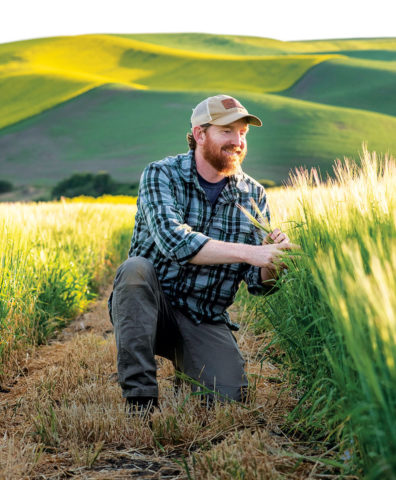Spelt, along with other so-called ancient grains, is experiencing a renaissance. Kevin Murphy, a Washington State University plant breeder who has worked with spelt for nearly 20 years, says chefs are looking for new flavors. And that search is driving a small but growing market for spelt.
When Murphy and his team developed a variety of spelt that ticked lots of boxes for farmers and chefs, they released it via the Open Source Seed Initiative (OSSI). The OSSI is “dedicated to maintaining fair and open access to plant genetic resources worldwide in order to ensure the availability of germplasm to farmers, gardeners, breeders, and communities of this and future generations,” according to its website.

(Photo Shawn Linehan)
Murphy released Elwha River spelt in 2017, the name commemorating the removal of two nonessential dams on the Olympic Peninsula river to encourage habitat and salmon restoration. Interest in trying the grain came fast, from the Culinary Breeding Network, as well as star chef Dan Barber, the founder of Row 7 (“a seed company dedicated to deliciousness”).
“It’s early days,” Murphy says, “but we connect farmers who grow these grains with restaurants that want to try them.”
At a dinner for 300 in New York, produced by the James Beard award-winning Barber, Elwha River spelt was used to prepare “a dessert made of spelt: the ice cream cone was made of spelt, the ice cream had spelt in it, and the crumbles on the ice cream were also spelt.” Martha Stewart, among other celebrities of the culinary world, was in attendance.
The great thing about working with chefs, Murphy says, is that “they take breeding lines and explain why they like them, which really helps us know what is working” in the kitchen.
By releasing Elwha River spelt through the OSSI, Murphy cast his bread upon the waters—and it’s paying off.
James Henderson, a longtime collaborator of Murphy’s, says the company he works for, Hummingbird Wholesale in Eugene, Oregon, is growing 130 acres of Elwha River spelt this season.
“There’s nothing bad to say about this spelt!” Henderson says. Unlike most spelts, Elwha is hulless, making it cheaper to produce than conventional varieties. In a good year, most spelts yield about 1,500 pounds per acre, but Elwha is putting out over 5,000. And because it outcompetes weeds, it is easy to grow organically. Elwha River spelt can also be malted for beer; a test fermentation produced a beautiful red brew.
Couple all that with excellent baking quality, Henderson says, “and you’ve got a home run.”
The nutritious grain, cultivated for over 8,000 years, never lost popularity in Europe, where it is used in baking, brewing, and distilling. With the Pacific Northwest’s fascination with artisanal cuisine, this grower- and baker-friendly spelt is sure to be a hit.
